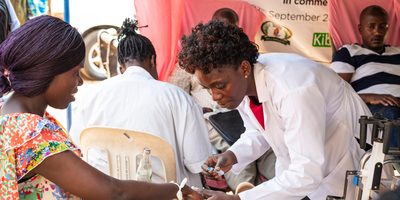
Meet Alexa Murray, Program Manager of The George Institute’s Africa Initiative
Alexa has joined The George Institute to support efforts at expanding partnerships and engagements in Africa. She has a Bachelors degree in Human Biology from Indiana University and a Masters in Public Health from The George Washington University in the United States. Studying to become a physician, Alexa switched gears after four years of pre-medical curriculum to pursue her passion of global health!
Prior to The George Institute, Alexa has worked as an epidemiologist for a state-wide tuberculosis program in the United States, co-ordinated sexual and reproductive health and rights programs in the Pacific, and implemented the first cervical screening and treatment program in Tuvalu.
What drew you to this role?
My motivation for being involved in any program or partnership lies in eliminating health disparities and inequity via sustainable program development. I was drawn to this position because of its focus on non-communicable diseases (NCDs) and injury in Africa, two rather underfunded issues in the continent. I also appreciate the timeliness of this type of work considering the exacerbated effects of climate change on NCDs. I was also drawn to the holistic approach of forging new partnerships in Africa, in that we are looking at health research, policy, advocacy, and capacity strengthening.
What is the aim of this initiative and what is the desired impact?
The primary aim is to have a positive impact on the health of people in Africa. To do this, we want to enable our researchers and students to create and maintain authentic partnerships with health researchers, institutions, and communities in Africa in a sensitive and respectful manner, enabling local capacity for addressing unmet health needs.
How does the Africa Initiative align with the Institute’s strategic pillars?
Providing better treatments, better care and creating healthier societies needs to be done through partnerships. We believe that through this initiative, we can promote partnerships that enable researchers and communities to respond to public health issues in Africa. For example, through internal and external partnerships, The George Institute’s Aboriginal and Torres Strait Islander Health Research Program has increased the representation of Aboriginal and Torres Strait Islander people in The George Institute’s research. We would like to replicate this approach and see the interests of African communities captured in the research done by each of the strategic pillars of the institute. Through this, we can share our expertise where it is needed, and in turn learn from the communities we seek to serve, ultimately increasing the global reach and impact of our research.
What are the guiding principles of this initiative?
The core principles of this initiative are authentic partnerships, having a long-term outlook, ensuring sustainability in all we do, staying people-centred and equity-focused. Essentially, we want to provide support needed for genuine engagements with researchers and communities in Africa.
What can potential partners and external stakeholders bring to this program and hope to achieve in return?
It all comes down to collaboration and shared value creation. Being involved in this initiative offers opportunities for bi-directional learning. When individuals and organisations increase their ability to learn and work in a different cultural setting, their capacity to offer value increases as well. By participating in this initiative, we envisage that there will be opportunities to discover innovative solutions to long-standing public health issues, participate in meaningful work where it is most needed, and gain recognition for ethical engagements in the continent. With positive recognition comes trust, trust from funding organisations who are interested in global health equity, and trust from researchers and communities in Africa who become more open to further collaborations.






